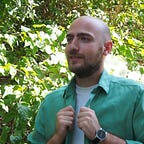He was nominated for 9 Nobels, supported by many but not by his own government. He hoped for nothing, he feared nothing — he was free.
“He deserved this Nobel 100 times more than me”, said Albert Camus for Nikos Kazantzakis, after winning the Nobel just one vote more from him.
Nikos Kazantzakis was one of the most renowned Greek writers and modern philosophers. His work has been read and appreciated in many countries. His most famous work was the world-renowned, “Zorba the Greek”, which as a movie was nominated for 7 Oscars, winning 3 of them. Additionally, he is famous for his memoir “Report to Greco” and the very controversial “The Last Temptation of Christ”. The last also became a movie, directed by Martin Scorsese and nominated for an Oscar.
He held a complex relationship with both the Greek government and the Church. During his lifetime, he was imprisoned for advocating communism and often received tough criticism from Greek church leaders. There was even a refusal from the Greek church to allow an open-casket funeral ceremony after his death. The dynamics of this relationship can be observed when at one time, the Greek church condemned his work and began a process to excommunicate him. To that he proceeded to respond as follows:
“You gave me a curse, Holy fathers, I give you a blessing: may your conscience be as clear as mine and may you be as moral and religious as I”
His book “The Last Temptation of Christ”, produced a response even from the Vatican, when Pope Pius XII placed this book as a forbidden one. To this Kazantzakis responded:
“Ad tuum, Domine, tribunal appello.”, implying that God will be his judge, not the church.
In 1956, he was awarded in Vienna the Peace Prize medal. Greece abstained from the ceremony.
Kazantzakis was a great writer. His many nominations showcase his talent and worth as well as how much respect he gathered across the literature community. With every nomination he earned, he also earned resistance and rejection from his own state, which openly opposed and sabotaged any of his nominations. Would he have won a Nobel, if it wasn’t for the resistance of the Greek government? Probably yes. Would he be the same writer and have produced the same work had he not received opposition from the government? Probably no. I think the greatest gift, Nikos Kazantzakis has to offer us comes here. Besides the great books, writing and thoughts — his greatest gift to us is the dilemma of what we seek from life and which role we take.
All of us have a question to answer every second of our lives. Who do we live this second for? In this answer, we aim to capture the scope of our life. Why did Kazantzakis oppose the establishment? Why did he go against the government and societal beliefs? Why did he support communism? Why did he provoke the church and Christianity? Why didn’t he win a Nobel? Did he even want to win a Nobel? Would his work carry the same value today if it wasn't for the resistance from the Greek establishment?
Nikos Kazantzakis is for me, a mentor. A mentor I will never meet (not in this life at least), but his work is a guide for my life. At the end of this article, I provide various small abstracts from his work, abstracts that can inspire a new way of thinking in all of us.
“Quietly and clearly, I look at the world and say: All that I see, feel, taste, smell and touch are simply creatures of my mind.” — Ascetic
“All my life one of my greatest desires has been to travel. To see and touch unknown countries, to swim in unknown seas, to circle the globe, and observe new lands, seas, people, and ideas with an insatiable appetite. To see everything for the first time and for the last time, casting a slow, prolonged glance. Then to close my eyes and feel the riches deposit themselves inside me calmly or stormily according to their pleasure, until time passes them at last through its fine sieve, straining the quintessence out of all the joys and sorrows.” — Report to Greco
“Look, one day I had gone to a little village. An old grandfather of ninety was busy planting an almond tree. ‘What are you doing, grandfather!’ I exclaimed. ‘Planting an almond tree?’ And he, bent as he was, turned around and said: ‘My son, I carry on as if I should never die.’ I then replied: ‘And I carry on as if I was going to die any minute.’ Which of us was right?” — Zorba the Greek
“This is true happiness: to have no ambition and to work like as if you had every ambition. To live far from men, not to need them, and yet to love them. To have the stars above, the land to your left and the sea to your right and to realize in your heart that life has accomplished its final miracle: it has become a fairy tale.” — Zorba the Greek
“You will, Judas, my brother. God will give you the strength because it is necessary — it is necessary for me to be killed and for you to betray me. We two must save the world. Help me.” Judas bowed his head. After a moment he asked, “If you had to betray your master, would you do it?” Jesus reflected for a long time. Finally, he said, “No, I’m afraid I wouldn’t be able to. That is why God pitied me and gave me the easier task: to be crucified.” — The Last Temptation of Christ
Lastly, regardless of what you believe in and what you read. Always remember the following.
“You have your brush, you have your colours, you then paint the paradise and then in you go.” Nikos Kazantzakis!
